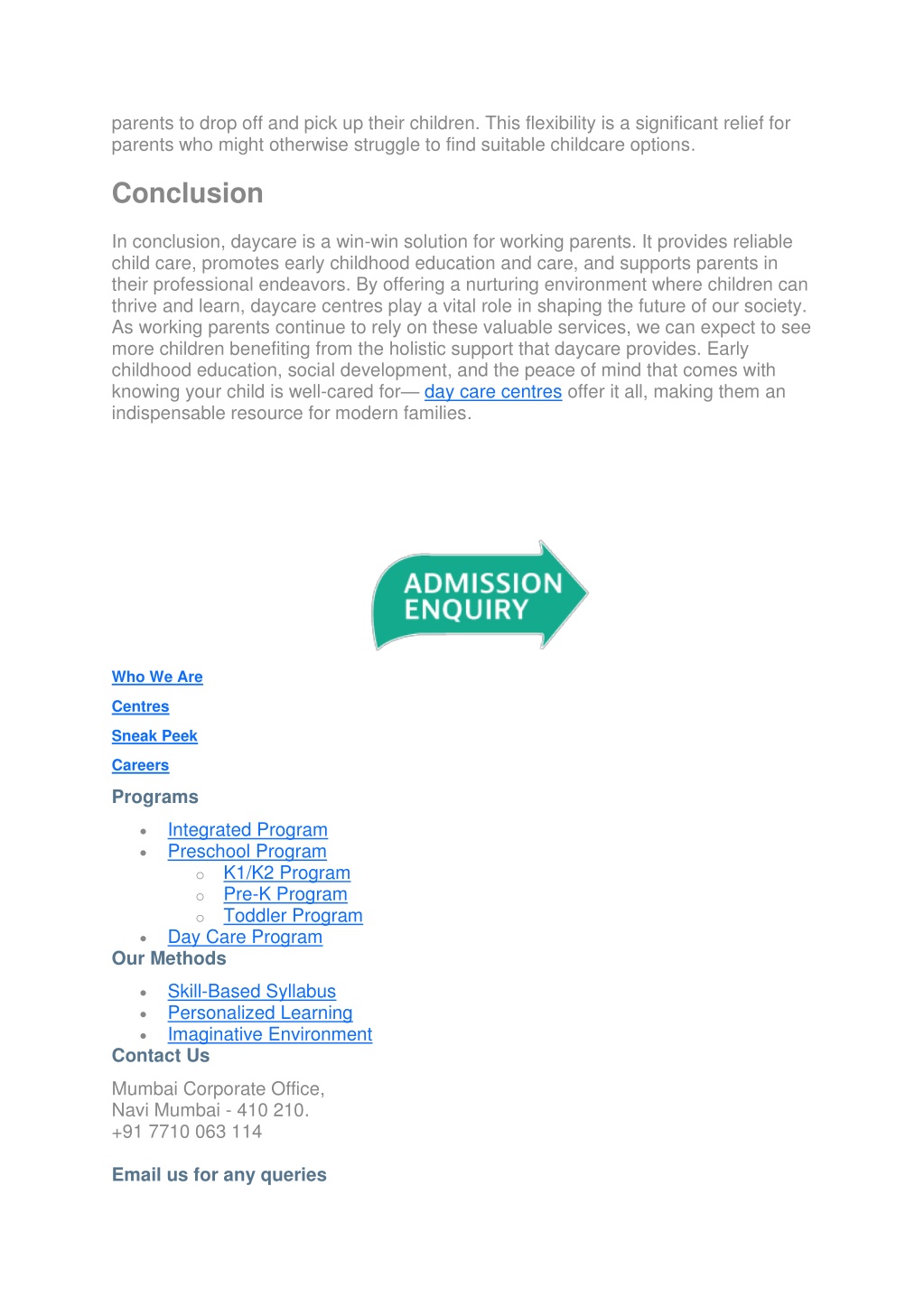Working Parents And Daycare: Navigating The Challenges

Table of Contents
Finding Affordable Daycare
The high cost of childcare is a major hurdle for many working parents. It often represents a significant portion of a family's budget, impacting financial stability and overall well-being.
The High Cost of Childcare
The financial burden of daycare can be substantial. Costs vary widely depending on several factors:
- Type of Daycare: In-home daycare typically costs less than center-based care, but center-based facilities often offer more structured programs and amenities. Preschools usually fall somewhere in between, often offering more specialized early childhood education.
- Geographic Location: Childcare costs vary significantly by region. Urban areas generally command higher prices than rural areas.
- Hidden Fees: Be aware of potential hidden fees, such as registration fees, supply fees, or late pick-up charges. These can add up quickly.
According to recent studies, childcare costs in many areas exceed the cost of college tuition. This significant financial strain can force families to make difficult choices, potentially impacting their career paths and overall financial security. Government reports consistently show the high percentage of household income dedicated to childcare.
Fortunately, some government assistance programs and subsidies exist for low-income families. These programs can help offset the cost of childcare, making it more accessible. It's crucial to research and apply for any available assistance in your area.
Strategies for Saving on Daycare Costs
Despite the high costs, there are strategies you can employ to reduce daycare expenses:
- Shared Childcare: Consider sharing childcare costs with another family. This can significantly reduce the individual financial burden.
- Employer-Sponsored Daycare: Many employers offer daycare subsidies or on-site childcare facilities. Check with your HR department to see if such programs are available.
- Before-and-After-School Programs: If your children are school-aged, explore before-and-after-school programs. These are often more affordable than full-day daycare.
- Tax Credits and Deductions: Research available tax credits and deductions for childcare expenses. These can provide significant financial relief.
[Link to relevant government website for childcare assistance] [Link to resource for finding tax credits]
Choosing the Right Daycare
Selecting the right daycare is a critical decision. It impacts your child's development, safety, and overall well-being.
Factors to Consider When Selecting Daycare
Several key factors should guide your daycare selection process:
- Location and Convenience: Choose a daycare that is conveniently located and easily accessible for your commute.
- Teacher-to-Child Ratio: Lower teacher-to-child ratios generally indicate more individualized attention for your child.
- Safety and Security Measures: Ensure the facility has robust safety and security measures in place, including secure entrances, emergency protocols, and background checks for staff.
- Curriculum and Educational Approach: Consider the daycare's curriculum and its alignment with your values and educational goals for your child.
- Licensing and Accreditation: Verify that the daycare is properly licensed and accredited by relevant authorities.
- Reviews and Testimonials: Read reviews and testimonials from other parents to get insights into their experiences.
Visiting and Interviewing Potential Daycares
Once you've identified potential daycares, take the time to visit and interview them:
- Create a Checklist: Develop a list of questions to ask potential providers about their programs, policies, and staff.
- Observe Classroom Interactions: Observe classroom interactions to assess the teachers' engagement with children and the overall learning environment.
- Assess Cleanliness and Organization: Check the cleanliness and organization of the facility.
- Understand Emergency Protocols: Thoroughly review their emergency procedures and protocols.
Managing Work-Life Balance with Daycare
Balancing work and family life is a major challenge for working parents. Effective strategies are crucial to maintain a healthy equilibrium.
Effective Time Management Techniques
Successful time management is paramount:
- Prioritize Tasks: Prioritize both work and family tasks, focusing on the most important items.
- Utilize Technology: Use technology such as calendars and to-do lists for scheduling and communication.
- Delegate Responsibilities: Don't be afraid to delegate tasks at work and at home when possible.
- Realistic Expectations: Set realistic expectations for both your work and personal life.
Communication with Daycare Providers
Open communication with your daycare provider is crucial:
- Establish Clear Communication Channels: Establish clear and consistent communication channels with your daycare provider.
- Regular Updates: Keep the daycare staff informed about any changes regarding your child's health or needs.
- Parent-Teacher Conferences: Actively participate in parent-teacher conferences.
- Address Concerns Promptly: Address any concerns or issues that arise promptly and professionally.
Addressing Guilt and Stress
Working parents often experience guilt and stress. It's important to acknowledge these emotions and develop coping mechanisms:
- Self-Care: Prioritize self-care activities to reduce stress and improve well-being.
- Seek Support: Seek support from family, friends, or support groups for working parents.
- Utilize Resources: Take advantage of resources available for working parents, such as online forums or counseling services.
- Mental Health: Prioritize your mental health. Don't hesitate to seek professional help if needed.
Dealing with Daycare Emergencies and Unexpected Closures
Unexpected events can disrupt childcare arrangements. Being prepared is vital.
Developing a Backup Plan
A solid backup plan is essential:
- Backup Childcare: Identify backup childcare options, such as family members, friends, or emergency daycare services.
- Emergency Contact List: Create a comprehensive contact list for emergencies, including family, friends, and daycare staff.
- Closure Plan: Develop a plan for unexpected closures due to weather or illness.
Communicating with Employers
Open communication with your employer is crucial during daycare emergencies:
- Utilize Company Policies: Utilize company sick leave or personal time off policies as needed.
- Transparent Communication: Communicate transparently with your supervisor about daycare-related emergencies.
- Flexible Work Arrangements: Explore the possibility of flexible work arrangements, such as working remotely or adjusting your schedule.
Conclusion
Finding the right daycare is a crucial step for working parents, impacting both their professional and personal lives. Navigating the challenges of affordability, selecting a suitable provider, managing work-life balance, and preparing for unexpected situations requires careful planning and proactive strategies. By implementing the tips and resources discussed in this article, working parents can find solutions to better manage the complexities of childcare and create a more harmonious work-life integration. Remember, the journey of finding the best fit for your family in terms of working parents and daycare is ongoing; continue to research, communicate, and advocate for your child's needs.

Featured Posts
-
 Polish Woman And Acquaintance Deny Charges Related To Mc Cann Family Harassment
May 09, 2025
Polish Woman And Acquaintance Deny Charges Related To Mc Cann Family Harassment
May 09, 2025 -
 Manchester Uniteds De Ligt Inter Milans Shock Loan Pursuit
May 09, 2025
Manchester Uniteds De Ligt Inter Milans Shock Loan Pursuit
May 09, 2025 -
 Figmas Ai Update A Game Changer Against Adobe Word Press And Canva
May 09, 2025
Figmas Ai Update A Game Changer Against Adobe Word Press And Canva
May 09, 2025 -
 Wireless Mesh Networks Market 9 8 Cagr Growth Forecast
May 09, 2025
Wireless Mesh Networks Market 9 8 Cagr Growth Forecast
May 09, 2025 -
 From Gang Violence To Political Flashpoint The Story Of Kilmar Abrego Garcia
May 09, 2025
From Gang Violence To Political Flashpoint The Story Of Kilmar Abrego Garcia
May 09, 2025
Latest Posts
-
 Public Access To Jeffrey Epstein Files Evaluating Ag Pam Bondis Choice
May 09, 2025
Public Access To Jeffrey Epstein Files Evaluating Ag Pam Bondis Choice
May 09, 2025 -
 Pam Bondi And James Comer Clash Over Epstein Files
May 09, 2025
Pam Bondi And James Comer Clash Over Epstein Files
May 09, 2025 -
 Should We See The Epstein Files Examining Ag Pam Bondis Decision
May 09, 2025
Should We See The Epstein Files Examining Ag Pam Bondis Decision
May 09, 2025 -
 Attorney General Pam Bondis Amusement At James Comers Epstein Claims
May 09, 2025
Attorney General Pam Bondis Amusement At James Comers Epstein Claims
May 09, 2025 -
 Pam Bondi Laughs Comers Epstein Files Tirade Sparks Controversy
May 09, 2025
Pam Bondi Laughs Comers Epstein Files Tirade Sparks Controversy
May 09, 2025
